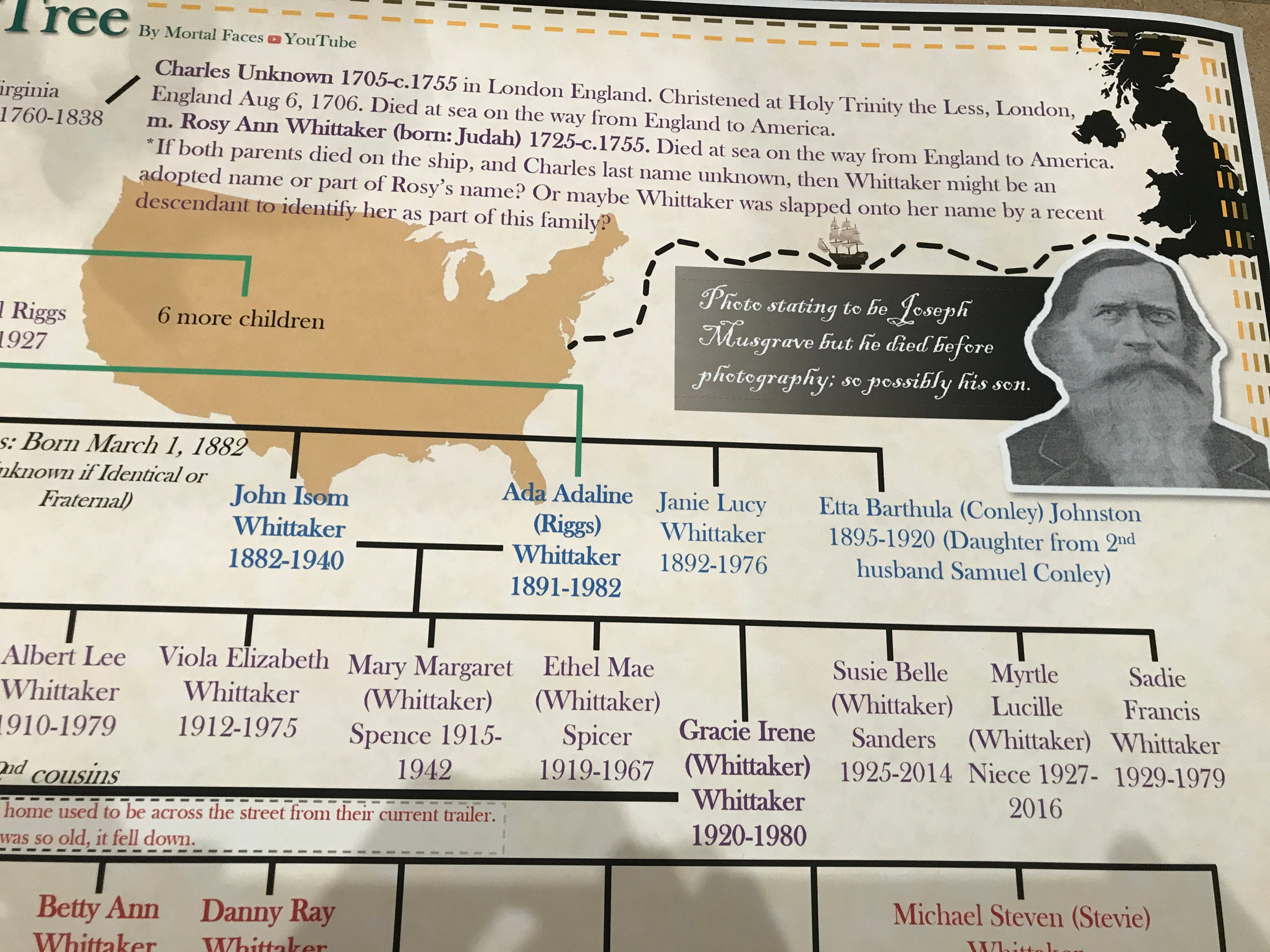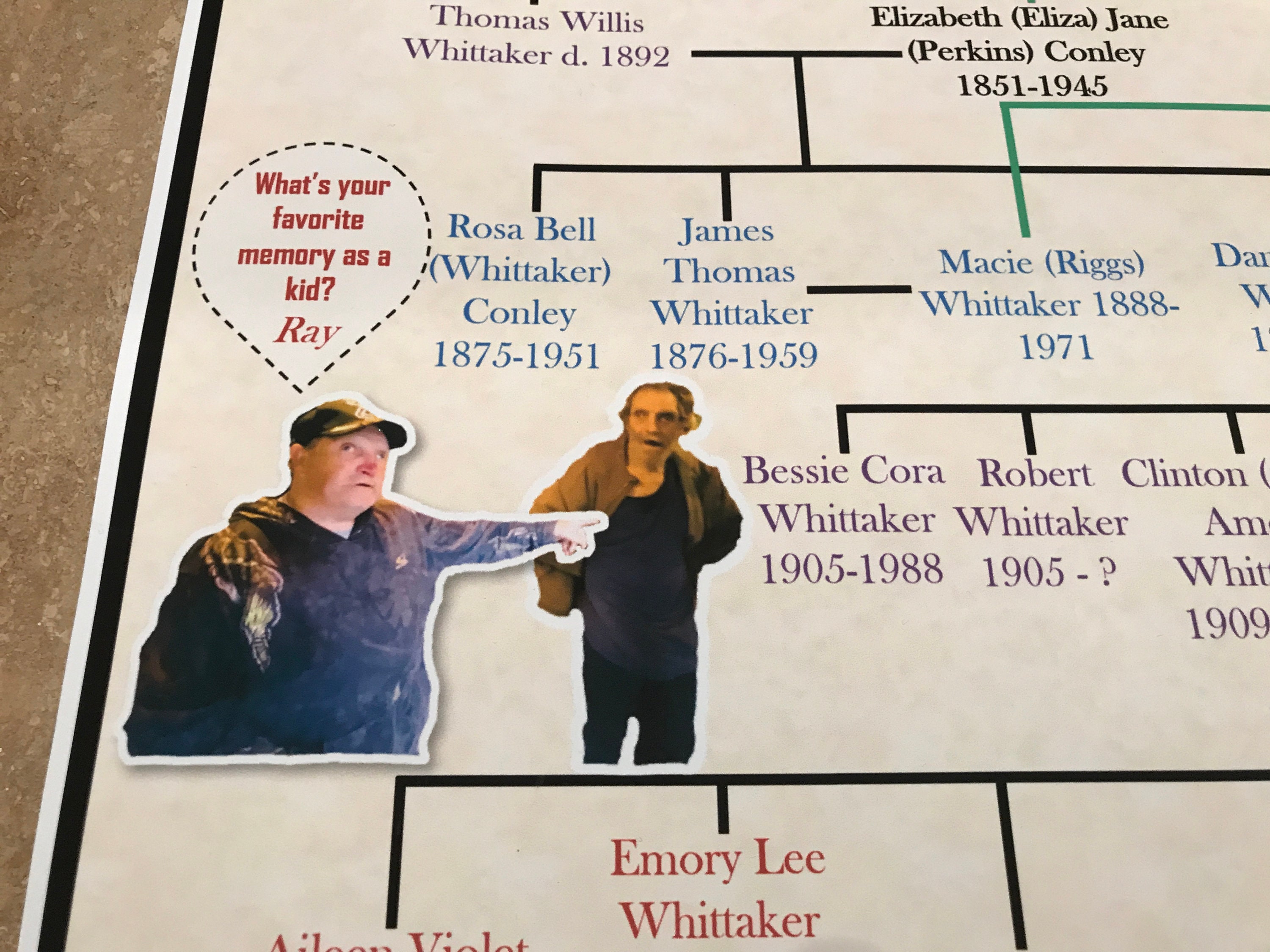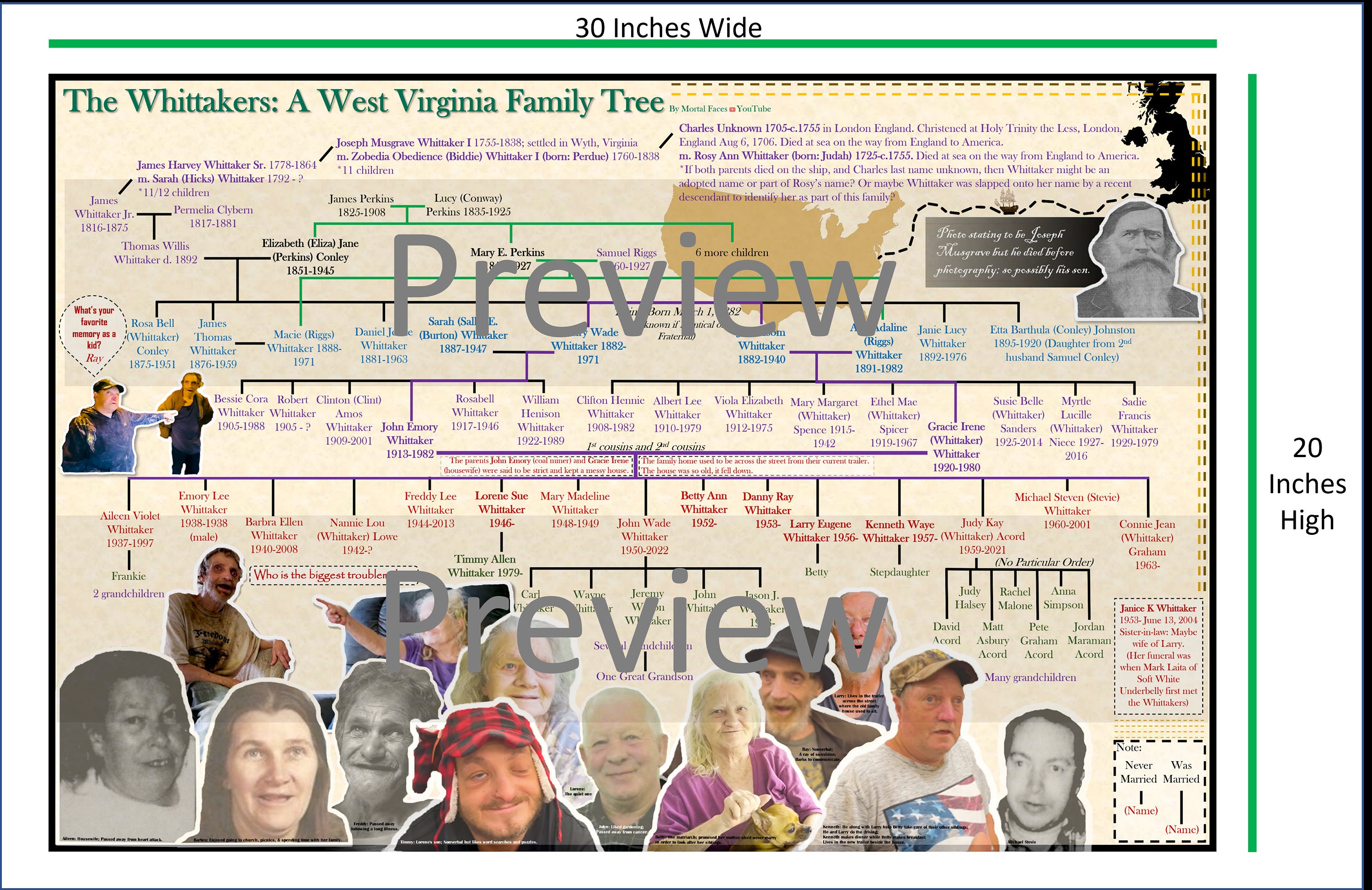Unearthing The Whitaker Family Tree: A Deep Dive Into Heritage
**The Whitaker family tree presents a captivating and intricate web of relationships that spans generations and continents, offering a unique lens through which to explore the complexities of human lineage and the enduring power of family narratives.** This article delves into the fascinating history of the Whitakers, examining their origins, the unique circumstances that brought them into the public eye, and the broader lessons their story offers about genealogy, genetics, and the very fabric of human connection.
By meticulously tracing the branches of this remarkable family, we uncover a rich tapestry of stories, decisions, and challenges that have shaped their destiny. From their ancient roots to the more recent revelations that have captivated audiences worldwide, understanding the Whitaker family tree is not just about names and dates; it's about comprehending the profound impact of heritage on individual lives and the collective human experience.
Table of Contents
- Unraveling The Whitaker Family Tree: A Journey Through Generations
- The Whitaker Family's Unique Narrative: "America's Most Inbred Family"
- Key Figures in the Whitaker Lineage: George, Rachel, and Joseph
- The Art and Science of Genealogy: Building a Family Tree
- The Broader Significance of Family History
- Navigating Ethical Considerations in Genealogical Research
- Conclusion: The Enduring Legacy of The Whitaker Family Tree
Unraveling The Whitaker Family Tree: A Journey Through Generations
The journey into the depths of the Whitaker family tree is one filled with historical intrigue and profound personal stories. This intricate lineage, stretching back centuries, offers a compelling case study for anyone interested in the enduring power of family bonds and the complex interplay of heritage and environment. By delving into its layers, we uncover a rich tapestry of stories and a fascinating progression of life events that have shaped this family's identity over time. Understanding the complete narrative of the Whitaker family tree requires patience and a keen eye for detail, as it weaves through different eras and societal norms.
The complexity of any extensive family tree lies not just in charting births, deaths, and marriages, but in understanding the decisions made by ancestors that ripple through generations. For the Whitakers, these decisions, often born out of necessity or circumstance, have played a significant role in defining their unique path. The narrative of the Whitaker family tree is a testament to how past choices can profoundly influence future outcomes, making it a subject of considerable interest to genealogists and social historians alike.
The Genesis: William and Abigail Whitaker's Legacy
The story of the Whitaker family, as it has gained public attention, often begins in the 19th century. The origins of the Whitaker family, particularly in the context of their more recent notoriety, are frequently traced back to the marriage of William and Abigail Whitaker in 1819. This foundational union marks a pivotal point from which many of the subsequent generations, and the unique characteristics associated with the family, began to unfold. Their marriage laid the groundwork for a lineage that would, centuries later, become a subject of intense public discussion and academic interest.
William and Abigail's union, like countless others of their time, was a simple beginning to what would become a deeply complex and widely discussed family structure. While the specifics of their daily lives and personal struggles from over two centuries ago remain largely unrecorded in public discourse, their decision to marry and raise a family set in motion a chain of events that would define the Whitaker family tree for generations. Their legacy is not just in the descendants they produced, but in the unique sociological and genetic narrative that emerged from their lineage, highlighting the often-unforeseen consequences of familial patterns.
Tracing Ancient Roots: From Norman Conquest to Warwickshire
While the recent narrative of the Whitaker family often centers on their 19th-century beginnings, the surname "Whitaker" itself boasts a much older, more expansive history. The Whitaker history seems to come in three parts, with its earliest documented roots tracing back to the period following the Norman Conquest of England in 1066. This suggests a deep, ancient lineage, far preceding the 19th-century focus. The surname Whitaker was first found in Warwickshire, a county in the West Midlands of England. This geographical origin provides a crucial piece of the puzzle for understanding the very early development and spread of the Whitaker name.
The presence of the Whitaker surname in Warwickshire so early in English history indicates that families bearing this name were established in the region for centuries, long before the specific branch that gained modern notoriety came into being. This broader historical context is vital for genealogists attempting to construct a comprehensive Whitaker family tree, as it allows for the differentiation between the ancient origins of the name and the more recent, specific lineage that has captured public attention. It underscores that while one particular branch of the Whitaker family tree has become prominent, the name itself carries a rich and diverse history spanning nearly a millennium.
The Whitaker Family's Unique Narrative: "America's Most Inbred Family"
The story of the Whitaker family tree, dubbed "America's most inbred family," has indeed surprised people around the world. This notoriety comes from their unique family structure and life circumstances, which have been extensively documented and discussed in various media. The term "inbred" refers to the historical practice of marriage between close relatives, which, over generations, can lead to a reduced genetic diversity within a family line. The public fascination with the Whitaker family stems from the visible manifestations of this phenomenon, leading to a complex and often sensitive discussion about their living conditions and genetic predispositions.
The public's engagement with the Whitaker family's story is a testament to the powerful human curiosity about the intricacies of family lineage and the impact of historical and social isolation. It highlights the importance of understanding the socio-economic factors that can contribute to such unique family structures, rather than simply sensationalizing their circumstances. The narrative surrounding the Whitaker family tree demands a nuanced approach, acknowledging the challenges they face while respecting their dignity and privacy.
The Impact of Genetic Factors and Life Circumstances
As part of his documentation, a researcher revealed their complex family tree, unveiling the decisions their ancestors made that led to some genetic mutations, disabilities, and difficulties for subsequent generations. This aspect of the Whitaker family tree is particularly sensitive and underscores the profound impact of genetic inheritance when certain patterns of marriage persist over time. The difficulties faced by members of the Whitaker family are a direct, albeit tragic, illustration of the principles of human genetics and the long-term consequences of limited genetic diversity.
It is crucial to approach this topic with empathy and a commitment to factual reporting, adhering to E-E-A-T (Expertise, Authoritativeness, Trustworthiness) and YMYL (Your Money or Your Life) principles, given the sensitive nature of health-related information. The documentation serves as a stark reminder of the responsibilities that come with genealogical research, especially when it touches upon personal health and well-being. The challenges observed within the Whitaker family tree are not a judgment but a scientific and sociological observation, prompting broader discussions about public health, education, and social support systems in isolated communities.
Key Figures in the Whitaker Lineage: George, Rachel, and Joseph
Within the sprawling branches of the Whitaker family tree, certain individuals emerge as key figures, whose lives contribute significantly to the overall narrative. While the family's story is often viewed through a collective lens due to its unique circumstances, individuals like George Whitaker, Rachel Whitaker, and Joseph Whitaker represent specific points of interest within this complex lineage. These names, mentioned in various documentations, serve as anchors in the extensive genealogical record, allowing researchers to trace specific lines of descent and understand the family's progression through time.
Unfortunately, detailed personal biographies for George, Rachel, and Joseph Whitaker are not widely available in public records beyond their mention as part of the broader family documentation. Unlike celebrities or public figures, their lives were primarily lived within the confines of their family and community, making extensive personal data difficult to compile. However, their inclusion in the documented Whitaker family tree is crucial for understanding the generational links and the perpetuation of the family's unique structure. They are vital pieces in the puzzle that is the Whitaker family's historical and genetic narrative.
The Art and Science of Genealogy: Building a Family Tree
Constructing a comprehensive family tree, like that of the Whitaker family, is both an art and a science. It requires meticulous research, critical analysis of historical documents, and often, a touch of detective work. Genealogists delve into a vast array of records—from birth, marriage, and death certificates to census data, land deeds, and old photographs—to piece together the lives of ancestors. The goal is not just to list names and dates but to understand the social, economic, and cultural contexts in which these individuals lived, thereby painting a vivid picture of their heritage. The process of building a family tree, especially one as intricate as the Whitaker family tree, highlights the importance of reliable data and systematic approaches to research.
In today's digital age, the tools and resources available to genealogists have expanded exponentially. Online databases, digitized archives, and collaborative platforms have transformed how family history is researched and shared. However, with this abundance of information comes the challenge of sifting through vast datasets, ensuring accuracy, and managing complex relationships. The skills required to navigate these digital landscapes are increasingly similar to those used in professional data management, emphasizing the blend of historical inquiry with modern technological proficiency.
Leveraging Digital Resources: Wikitree and Beyond
For anyone embarking on the journey of tracing their own lineage or contributing to a collective genealogical effort, digital platforms are invaluable. Wikitree is an excellent example of such a resource, serving as a collaborative global family tree that is free forever. It encourages users to search for their ancestors, share their genealogy, and even compare DNA to grow an accurate, interconnected family tree. The question "Are your Whitaker ancestors on Wikitree yet?" highlights the platform's relevance for families like the Whitakers, allowing for the potential discovery of new connections and the verification of existing information. With a vast database, users can search 8,311 individuals and then contribute their findings, making it a dynamic and ever-growing repository of human history.
Beyond Wikitree, numerous other online archives, historical societies' digital collections, and commercial genealogy sites offer access to billions of records. These platforms often employ advanced search functionalities, allowing researchers to browse in a lookup column, or select a lookup icon (magnifying glass) to refine their queries. The sheer volume of data available means that genealogists must be adept at using these digital tools to efficiently navigate through records and identify relevant information, much like how one might use an ABN Lookup for Australian business numbers to find specific company details from the government website. This parallel underscores the systematic approach required for effective genealogical research in the digital age.
Data Management in Genealogy: Beyond Simple Lookups
The sheer volume and complexity of genealogical data necessitate robust data management strategies, far beyond simple lookups. Imagine trying to organize thousands of names, dates, places, and relationships without a systematic approach. This is where the principles of database management and data retrieval become surprisingly relevant to building a comprehensive family tree. For instance, just as a business might use a system like Dynamics GP with an ABN Lookup for Australian company numbers, genealogists often employ specialized software or advanced spreadsheet techniques to manage their findings. These tools allow for complex filtering, where "the number in front of type of records represents how many table are available to filter from," enabling researchers to quickly isolate specific family lines or historical periods.
The challenge of data management extends to accessibility and reliability. Just as a user might encounter an "ERR_CONNECTION_TIMED_OUT" error when trying to access a website, signifying a failure to establish a connection within a specified time, genealogists can face similar hurdles with online archives or databases. Sometimes, this might even involve troubleshooting network settings, akin to adjusting APN settings on a mobile phone (e.g., 'cuiot', '3gnet', 'wonet', 'scuiot' for mobile networks) to ensure stable access to online resources. Moreover, the ability to analyze and present this data effectively is crucial. Tools like VLOOKUP functions, often used in spreadsheets for looking up and retrieving data from large tables, can be incredibly powerful for cross-referencing information across different genealogical records. While a full understanding of "VLOOKUP's 16 usages" might seem overkill for a casual family historian, the underlying principle of efficient data retrieval and organization is paramount for anyone serious about constructing an accurate and detailed Whitaker family tree or any other lineage. The need for verified, reliable data is constant, and understanding how data is structured and accessed is key to avoiding errors and building a truly trustworthy genealogical record.
The Broader Significance of Family History
The study of family history, exemplified by the detailed examination of the Whitaker family tree, extends far beyond mere curiosity about one's ancestors. It offers profound insights into personal identity, cultural heritage, and the broader sweep of human migration and societal change. By understanding where we come from, we gain a clearer perspective on who we are and the forces that have shaped our present. Family history research can reveal hidden connections, uncover forgotten stories of resilience and struggle, and provide a sense of belonging that transcends time.
Moreover, genealogical studies contribute significantly to academic fields such as history, sociology, and genetics. The Whitaker family tree, with its unique genetic and social narrative, serves as a powerful case study for understanding the long-term effects of specific societal patterns. It highlights how individual family histories, when meticulously documented and analyzed, can offer invaluable data for scientific and social research, helping us to better understand human populations, genetic predispositions, and the impact of environmental and social factors on health and well-being across generations.
Navigating Ethical Considerations in Genealogical Research
When delving into family histories, especially those with sensitive aspects like the Whitaker family tree, ethical considerations become paramount. The principles of E-E-A-T (Expertise, Authoritativeness, Trustworthiness) and YMYL (Your Money or Your Life) are particularly relevant here. Researchers and writers must ensure accuracy, avoid sensationalism, and treat the subjects of their research with dignity and respect. This means verifying information from multiple trusted sources, presenting findings in a balanced and non-judgmental manner, and being mindful of the privacy and well-being of living individuals.
For the Whitaker family, whose story has garnered significant public attention due to deeply personal and challenging circumstances, responsible reporting is crucial. It is essential to focus on the factual documentation of their lineage and the sociological or genetic implications, rather than exploiting their situation for entertainment. Genealogists and historians have a responsibility to educate and inform, contributing to a deeper understanding of human diversity and the complex factors that shape family trajectories, while always upholding the highest ethical standards in their pursuit of knowledge.
Conclusion: The Enduring Legacy of The Whitaker Family Tree
The Whitaker family tree stands as a testament to the enduring power and intricate nature of human lineage. From its ancient roots in Warwickshire following the Norman Conquest to the 19th-century union of William and Abigail Whitaker, and the subsequent generations including George, Rachel, and Joseph, this family's story is a rich tapestry of history, genetics, and societal interaction. The public's fascination with their unique narrative, often labeled "America's most inbred family," underscores the profound impact of ancestral decisions and environmental factors on subsequent generations, particularly concerning genetic predispositions and life challenges.
Exploring the Whitaker family tree not only offers a compelling historical account but also serves as a powerful reminder of the complexities inherent in genealogical research. It highlights the critical role of digital resources like Wikitree and the importance of robust data management strategies, akin to those used in business systems with ABN Lookups or spreadsheet functions like VLOOKUP, to navigate vast amounts of information. Ultimately, the Whitaker family's story encourages us to approach family history with a blend of scientific rigor, ethical sensitivity, and profound empathy.
What are your thoughts on the complexities of family history, particularly when it touches upon sensitive topics? Share your insights and experiences in the comments below. If this deep dive into the Whitaker family tree has piqued your interest in genealogy, consider exploring your own family history using the resources mentioned, and share this article with others who might find this intricate narrative as captivating as we do.

The Whittaker's Inbred Family Tree 30in X 20in Poster - Digital

Uncovering The Whitaker Family Tree: Generations Revealed

The Whittaker's Inbred Family Tree 30in X 20in Poster - Digital